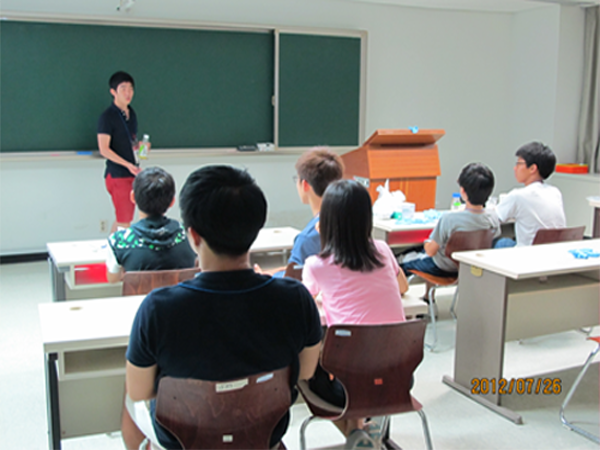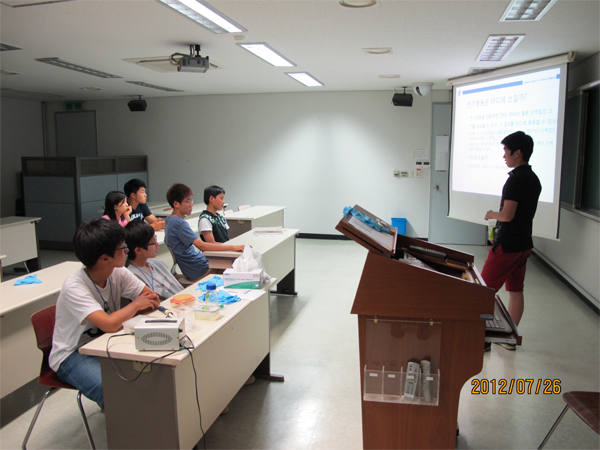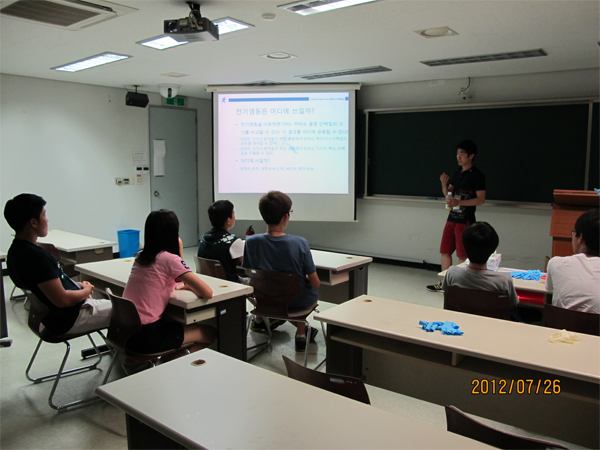Team:KAIST Korea/Plus Human
From 2012.igem.org
(Difference between revisions)
| Line 361: | Line 361: | ||
<img id="starter-grad" style="height:140px" src="https://static.igem.org/mediawiki/2012/9/95/Starter_gradient_kaist.png"></img> | <img id="starter-grad" style="height:140px" src="https://static.igem.org/mediawiki/2012/9/95/Starter_gradient_kaist.png"></img> | ||
| - | <h1>Human Practices</h1> | + | <h1>Human Practices-1</h1> |
<span id="sub-title"> | <span id="sub-title"> | ||
| Line 376: | Line 376: | ||
<a href="https://static.igem.org/mediawiki/2012/c/cb/KAIST_Slider_photo_3.png" title="Third Image"><img src="https://static.igem.org/mediawiki/2012/c/cb/KAIST_Slider_photo_3.png" /></a> | <a href="https://static.igem.org/mediawiki/2012/c/cb/KAIST_Slider_photo_3.png" title="Third Image"><img src="https://static.igem.org/mediawiki/2012/c/cb/KAIST_Slider_photo_3.png" /></a> | ||
<a href="https://static.igem.org/mediawiki/2012/9/9b/KAIST_Slider_photo_4.png" title="Fourth Image"><img src="https://static.igem.org/mediawiki/2012/9/9b/KAIST_Slider_photo_4.png" /></a> | <a href="https://static.igem.org/mediawiki/2012/9/9b/KAIST_Slider_photo_4.png" title="Fourth Image"><img src="https://static.igem.org/mediawiki/2012/9/9b/KAIST_Slider_photo_4.png" /></a> | ||
| - | <a href="https://static.igem.org/mediawiki/2012/e/eb/KAIST_Slider_photo_5.png" title=" | + | <a href="https://static.igem.org/mediawiki/2012/e/eb/KAIST_Slider_photo_5.png" title="Fifth Image"><img src="https://static.igem.org/mediawiki/2012/e/eb/KAIST_Slider_photo_5.png" /></a> |
| - | <a href="https://static.igem.org/mediawiki/2012/1/12/KAIST_Slider_photo_6.png" title=" | + | <a href="https://static.igem.org/mediawiki/2012/1/12/KAIST_Slider_photo_6.png" title="Sixth Image"><img src="https://static.igem.org/mediawiki/2012/1/12/KAIST_Slider_photo_6.png" /></a> |
| - | <a href="https://static.igem.org/mediawiki/2012/8/89/KAIST_Slider_photo_7.png" title=" | + | <a href="https://static.igem.org/mediawiki/2012/8/89/KAIST_Slider_photo_7.png" title="Seventh Image"><img src="https://static.igem.org/mediawiki/2012/8/89/KAIST_Slider_photo_7.png" /></a> |
| - | <a href="https://static.igem.org/mediawiki/2012/5/58/KAIST_Slider_photo_8.png" title=" | + | <a href="https://static.igem.org/mediawiki/2012/5/58/KAIST_Slider_photo_8.png" title="Eighth Image"><img src="https://static.igem.org/mediawiki/2012/5/58/KAIST_Slider_photo_8.png" /></a> |
</div> | </div> | ||
</br></br> | </br></br> | ||
| Line 408: | Line 408: | ||
| + | <img id="starter-grad" style="height:60px" src="https://static.igem.org/mediawiki/2012/9/95/Starter_gradient_kaist.png"></img> | ||
| + | <h1>Human Practices-2</h1> | ||
| + | </br></br></br></br> | ||
| + | <span id="little"> | ||
| + | <span id="starter">W</span>e went to Seoul Science High school to give out a lecture about synthetic biology and iGEM competition. As mentioned before, the reason to visit Seoul Science High school is that the students of that school seemed to be the most potential group of juveniles for future synthetic biologist as well as iGEMer. In addition, the school is known as the best science high school of Korea, thus we expected them to understand and grow interest about this specific field. Among numerous students of that school, those who are majoring in biology attended our lecture. </span></br> | ||
| + | |||
| + | </br></br> | ||
| + | <div id="smart-gallery"> | ||
| + | <a href="https://static.igem.org/mediawiki/2012/2/25/KAIST_Slider_photo_1.png" title="First Image"><img src="https://static.igem.org/mediawiki/2012/2/25/KAIST_Slider_photo_1.png" /></a> | ||
| + | <a href="https://static.igem.org/mediawiki/2012/f/f3/KAIST_Slider_photo_2.png" title="Second Image"><img src="https://static.igem.org/mediawiki/2012/f/f3/KAIST_Slider_photo_2.png" /></a> | ||
| + | <a href="https://static.igem.org/mediawiki/2012/c/cb/KAIST_Slider_photo_3.png" title="Third Image"><img src="https://static.igem.org/mediawiki/2012/c/cb/KAIST_Slider_photo_3.png" /></a> | ||
| + | <a href="https://static.igem.org/mediawiki/2012/9/9b/KAIST_Slider_photo_4.png" title="Fourth Image"><img src="https://static.igem.org/mediawiki/2012/9/9b/KAIST_Slider_photo_4.png" /></a> | ||
| + | <a href="https://static.igem.org/mediawiki/2012/e/eb/KAIST_Slider_photo_5.png" title="Fifth Image"><img src="https://static.igem.org/mediawiki/2012/e/eb/KAIST_Slider_photo_5.png" /></a> | ||
| + | <a href="https://static.igem.org/mediawiki/2012/1/12/KAIST_Slider_photo_6.png" title="Sixth Image"><img src="https://static.igem.org/mediawiki/2012/1/12/KAIST_Slider_photo_6.png" /></a> | ||
| + | <a href="https://static.igem.org/mediawiki/2012/8/89/KAIST_Slider_photo_7.png" title="Seventh Image"><img src="https://static.igem.org/mediawiki/2012/8/89/KAIST_Slider_photo_7.png" /></a> | ||
| + | <a href="https://static.igem.org/mediawiki/2012/5/58/KAIST_Slider_photo_8.png" title="Eighth Image"><img src="https://static.igem.org/mediawiki/2012/5/58/KAIST_Slider_photo_8.png" /></a> | ||
| + | </div> | ||
| + | </br></br> | ||
| + | |||
| + | |||
| + | <span id="little"> | ||
| + | In that school, as it is a school specialized for teaching science, every student takes science courses and those courses are specialized for future scientists. Hence, for the lecture, we prepared contents and materials more detailed about synthetic biology than those we taught in kids’ camp or undergraduates’ conference. We first introduced what is synthetic biology and let them discuss over the concept and expected pros and cons of it. We tried not to focus only on the bright side of synthetic biology but to let them know about potential problems of the field. Then, we went over the short history of several attempts to modify and eventually make artificial organisms. We also covered the concept of LMO and GMO which is misused a lot in Korea. Then, we moved to current status of synthetic biology, related fields, leading figure of synthetic biology, and growing industry on behalf of synthetic biology. We talked over minimal genome, a project conducted by Craig Venter, a famous scientist who is known as the first person to generate a completely synthetic creature. At that moment, our future biologists’ eyes glowed, full of thrill and excitement. Then we introduced the idea of generating biobricks, a main goal of iGEM, which are and will play a significant role in synthesizing new organisms. Of course, we told them about iGEM, the biggest opportunity to fabricate biobricks and be a synthetic biologist. At this point, some of them asked about iGEM and its advantages. We shared our experiences with them as well as our project in concise to let them know the beauty of iGEM; unlimited opportunity. </span></br> | ||
| + | <span id="little"> | ||
| + | During the course, we could give them a new point of view that biology is not only about science but about engineering also due to this emerging field. Since they used to have lectures about traditional biology, our lecture was very refreshing and fascinating to them. Some of them were eager to ask us how they can prepare for this global competition. There, we could directly feel their enthusiasm toward science, especially for biology and saw the future of synthetic biology. We were asked to keep giving our lecture about this awesome field in other science high schools because students of Seoul Science High school wanted to share the idea and their dream with others. Even though they were aware of potential problems and issues of synthetic biology, we could easily notice that they understood well about them and still wanted to do their research in this field. Due to them, we are planning to visit other schools to introduce about synthetic biology and iGEM and distribute the creative idea even after 2012 iGEM competition ends. </span></br> | ||
</div> | </div> | ||
Revision as of 22:19, 26 September 2012


2012 KAIST Korea
Mail : kaist.igem.2012@gmail.com
Twitter : twitter.com/KAIST_iGEM_2012
Facebook : www.facebook.com/KAISTiGEM2012

Plus : Human Practices


Human Practices-1
The primary economy of the earth is photosynthesis. We human species make up only 0.5% of the whole biomass in the earth. However human civilization is based on petroleum which depletes every second. This is not sustainable. – Jeremy Rifkin We all know that the world economy largely rely on petroleum and it is now in a huge crisis due to its depletion. Many ideas and technologies have been suggested to replace the petroleum based system but they all have limitations. However, we, KAIST iGEM 2012 Team suggest a totally new but effective idea to substitute the conventional system. We try to produce an E. coli which can survive on CO2 and H2 as well as produce biomass, especially acetyl CoA. In this system, the substitute of petroleum system can resolve both problems of energy and material. In addition, it may relieve the global warming by consuming greenhouse gas. We are working on a project which may have great effects to our future. We believe it to be helpful and useful for human civilization but we still have to consider both the bright and dark sides of it. To do so, we have or have planned to introduce the concept of our project and synthetic biology and then share ideas about them with the public. Since synthetic biology is not very familiar to the public in Korea, we prepared some lectures for this. As people of different ages would have different thoughts and thus give various opinions about synthetic biology, we divided the public into three groups; kids (middle school students), juveniles (high school students), and adults. We made contact to most prosperous and leading people of each group and have talked about synthetic biology and the project of KAIST iGEM 2012.- Talk with middle school students
- Talk with high school students
- Talk with adults

 "
"














